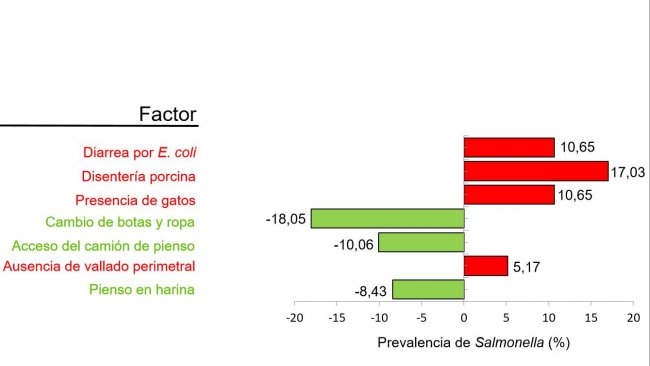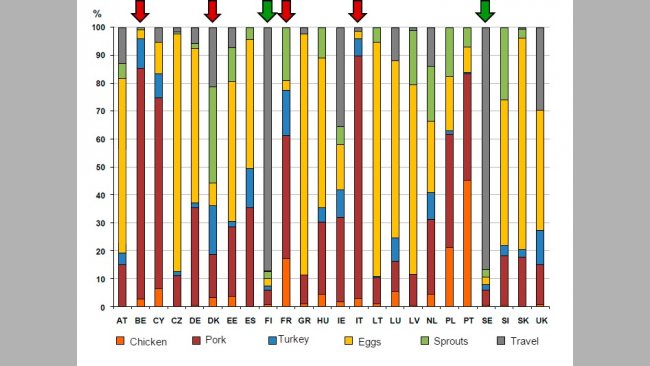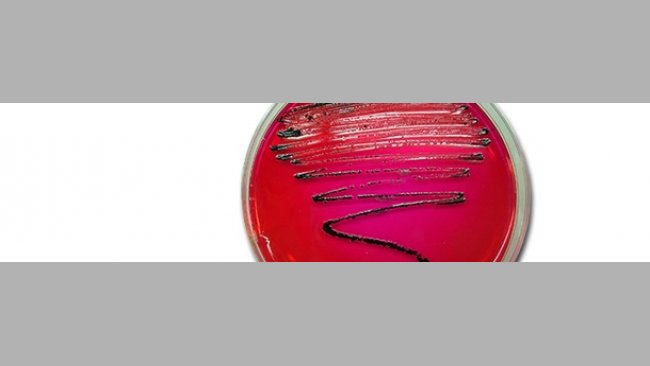
What are the characteristics of the farms with the highest seroprevalence of Salmonella ?
Feeding, biosecurity and concomitant diseases as factors involved in the perpetuation of Salmonella in the farm.
The pig sector events all around the world
Pig health: news and articles on PRRS, PCV2, biosecurity, etc, Pig disease guide, atlas of pathology, clinical cases…
A visual and practical step-by-step guide on how to perform a necropsy on a pig.
All the information about ASF: how to recognize the disease, how it is transmitted, pictures of lesions, latest news, guides, etc.
Description of the most important diseases and conditions in pigs
Images of major swine diseases
Pig disease diagnostic tool
Definition for the most commonly used pig terms
Simulator that calculates the amount of drug to add to the water when using a flow dispenser.
Pig Prices by countries. Pork production and trade. News of the pig market and the raw materials
The latest slaughter pig prices in the most important pig markets. Check the evolution of the historical prices in charts and in several currencies.
Latest quotations for the main commodities used in pig feed. Historical graphs with the pig price and estimated feed price.
Figures & trends in pig numbers, pork production and pork trade.
Global production and trade data for the most important raw materials
Articles on nutrition and pig feeding, characteristics of raw materials and additives for pig feed. Prices of raw materials
Latest quotations for the main commodities used in pig feed. Historical graphs with the pig price and estimated feed price.
Technical sheets of the main raw materials and additives used in swine feed. They include a comparison of nutritional values from various sources, product
Global production and trade data for the most important raw materials
Definition for the most commonly used pig terms
Use this tool to diagnose problems with the feed conversion ratio. Click on the flowchart or on the buttons within the text to navigate through the different parts of the tool.
Articles on genetics and pig reproduction: genetic improvement, genomics, artificial insemination, use of hormones
Compare production data, calculate the number of sow, nursery, and finishing spaces, and visualize your tasks on the work schedule by type of BMS.
Tool that allows you to calculate the replacement rate in your farm
Definition for the most commonly used pig terms
Use this tool to find out why your farrowing rate is less than ideal. Click on the flowchart or on the buttons found within the text to navigate through the different parts of the tool.
Management, pig farm management, work planning in each production stage: management in gestation, grow finish, batch farrowing
Compare production data, calculate the number of sow, nursery, and finishing spaces, and visualize your tasks on the work schedule by type of BMS.
Tool that allows you to calculate the replacement rate in your farm
Definition for the most commonly used pig terms
Design of facilities and equipment for pig farms: building design, climate control, feeding systems, etc.
Definition for the most commonly used pig terms
Use this tool to explore which slurry management strategy best fits your situation. Click on the flow chart or on the buttons within the text to navigate through the different parts of the tool.
What makes us stand out is the quality and independence of our contents. Find out about the authors who make it possible. Our goal is to generate a virtual community of advanced users in the sector.

Bsc in Veterinary Medicine/Science from the University of Leon (2007), and Ph.D. from the University of Leon (2013) in the Department of Animal Health with the doctoral thesis “Swine salmonellosis in Spain: Risk factors in breeders, control strategies in the fattening stage and the importance of the slaughter”.
He is currently (since February 2016) a Juan de la Cierva Training post-doctoral researcher at the Animal Genomic and Biotechnological Research Group at the University of Cordoba (Spain), where he takes part in the study of the pathogen-host interaction in swine intestinal diseases with a special focus on the invasion mechanisms and the role of the microbiota in the infection.
Before, he worked as a researcher at the University of Leon (2007-2013) and at the Department of Food Safety of the Teagasc, Ireland (2013-2016).
Hector Arguello has worked in lines of research related to the on-farm pathogenesis, diagnosis and control of gastrointestinal diseases of swine, as well as in the evaluation of antimicrobial resistances in pathogens such as Salmonella and E. coli; and in alternatives to antibiotic therapy (new antimicrobial agents, genetic resistances, additives, etc.). He is a member of the Committee of Experts of the FAO for the control of Salmonella in cattle and swine (2015).
Updated CV 17-Feb-2017

Feeding, biosecurity and concomitant diseases as factors involved in the perpetuation of Salmonella in the farm.

Control programs, which should have started in 2012, have not yet been implemented in most European countries today

In this article Salmonella critical contamination points in the abattoir will be analyzed, as well as the measures that can be taken with regard to them.

The risk of contamination by Salmonella increases along the food chain, reaching its maximum in the abattoir. So, the abattoir is one of the points in which the actions carried out can be most effective.
Welcome to 333
Connect, share, and interact with the largest community of professionals in the swine industry.
Celebrating 137775Users on 333!
Sign upAlready a member?




